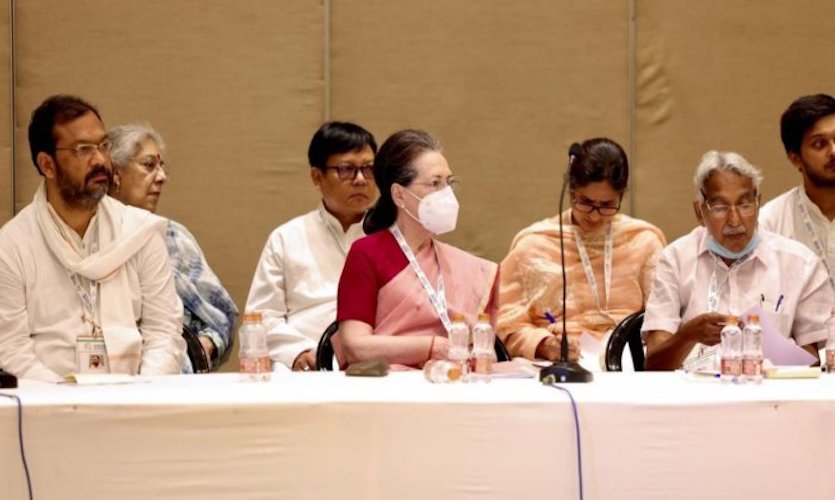As per the Congress’ Udaipur Declaration, the party’s core feature is nationalism, and it has accused the BJP of engaging in ‘false nationalism’ that is focused solely on winning votes. In the declaration, the grand old party has stated that it will keep its coalition options open and continue to talk with “like-minded parties”. The Congress Working Committee is poised to ratify its ‘Nav Sankalp’ proclamation, which lays out many organisational changes, and the party’s position on several critical issues.
The last round of deliberations took place on Sunday, during the Chintan Shivir, with several panels presenting their reports to Congress president Sonia Gandhi, who would then forward them to the CWC for final approval. Prominent Congress leaders such as Rahul Gandhi, Mallikarjun Kharge, Ghulam Nabi Azad, P Chidambaram, and Priyanka Gandhi Vadra attended the CWC meeting.
Following a series of electoral losses, the Chintan Shivir was intended to bring together Congress leaders from around the nation to discuss party reforms and measures, and to counter the BJP’s grip ahead of the next elections. The party officials discussed ways to oppose the BJP’s Hindutva-driven politics on the penultimate day of the Shivir. The discussions were reportedly candid, and at times angry. Whether to mention ‘Hindu’ or ‘Hindutva’ in the committee’s report, was a point of debate. According to reports, the Udaipur Declaration was approved on the third day of the Chintan Shivir.
Sonia Gandhi remarked on the first day of deliberations that the party has to “self-reflect” since the circumstance they are in is “unprecedented”. She stated that extraordinary circumstances necessitate extraordinary actions. There were a few suggested changes such as: imposing an age ceiling for leaders to hold positions in the organisation at all levels and to contest elections, and a term limit for Rajya Sabha members; enforcing a ‘one family, one poll ticket’ rule (with conditions); and a three-year cooling-off period for office-bearers at all levels, including All India Congress Committee (AICC) general secretaries, after a five-year term.
As per media reports, tickets will not be issued to families of Congress leaders anymore, unless the relative in question has worked for the party for at least five years. All office-bearers from the AICC, Pradesh Congress Committees, district and block committees, other departments/cells, and frontal organisations, should have a five-year term, as per the proposal. The office bearers will have to retire from their positions once their term is over. If the leader returns to the same position, there will be a three-year cooling period. All committee members will be under the age of 50. Moreover, padyatras and janta durbars will also be organised in order to engage with the people and combat the BJP.
According to a report by the Deccan Herald, the Congress Working Committee also reviewed the recommendations of six committees but rejected ideas like having a retirement age for leaders, an advisory council made up of elders, and quotas for OBCs in Parliament and state legislatures, among others.
One of the committees on social justice made recommendations to reserve seats in Parliament and assemblies for OBCs on the same basis as SCs and STs. It said that SCs, STs, OBCs, and minorities should receive 50 percent of organisational jobs. The CWC, on the other hand, approved the notion to advocate for quota inside quota in the Women’s Reservation Bill, but none of these were adopted. The panel’s proposal for a private sector quota was also rejected.
The youth panel received 50 percent representation in the organisation and elections, but its strident demands for retirement, and an age restriction for holding organisational positions and participating in elections, were denied by the leadership. However, the youth group was able to have its ideas included in the Udaipur Declaration as suggestions rather than choices. As per the declaration, the youth group also came to the conclusion that the retirement age should be set in Parliament, legislatures, the Legislative Council, and all elected positions.










